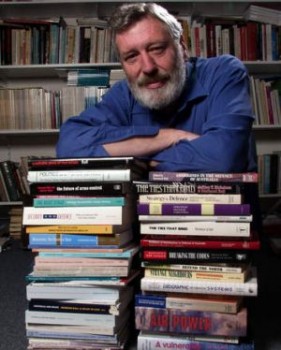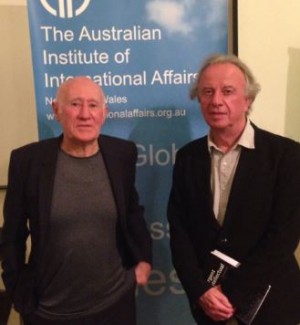Des Ball: opening closed doors
Hamish McDonald, AIIA Fellow and prominent analyst, and Dr Bob Howard, Sydney University international politics expert and AIIA Councillor, addressed the AIIA event on Tuesday 24 October in honour of the late Professor Desmond Ball AO FAIIA.
Hamish opened with an account of Des’s origins in country Victoria, where his outstanding school results led to a place at the ANU. There, against the background of growing restiveness about Australia’s involvement in the Vietnam war, he moved from economics to study political science and strategic policy. His focus on Pine Gap began with the Whitlam government’s revelations about its intelligence-gathering functions, and became a life-long expertise.
Bob described Des’s close relationship with his mentor Professor Hedley Bull. While supportive of the peace movement, Des was a realist who believed that the study of strategy was a legitimate area of enquiry for those interested in peace as well as war. He was also of the view that the principal aim of arms control should be a stable nuclear balance between the US and the USSR. These views were not popular in all scholarly circles at the time, but the young Des Ball embraced them both. It was this that led him to criticise aspects of American nuclear doctrine which had lent credence to the view that limited nuclear war was a feasible option: his major contribution to strategic thinking was that he thoroughly debunked the idea that nuclear exchanges could be controlled in any way. This encouraged a re-think in US strategic doctrine that led former President Jimmy Carter to declare that Des had saved the world.
Hamish recalled the suspicion of senior Australian officials resulting from Des’s determination to investigate intelligence gathering (and perhaps from his bearded, bare-foot persona and readiness to roll a joint). In contrast, he developed good access to US officials at the highest levels of strategic thinking – their security culture was not as protective as ours. The thoroughness of his research was matched not only by an ability to develop close relations with defence, intelligence and other officials, but also by his prodigious memory.
Des had recently moved from a supportive approach to Pine Gap to concern about its changing function – no longer providing a unique intelligence capacity, and now closely involved in remote-controlled US military activity. In this situation Des had begun to question the value, on balance, of the US alliance.
Hamish praised Des’s many publications including his ground-breaking first work on Pine Gap, A Suitable Piece of Real Estate. He and Hamish had jointly written Death in Balibo, Lies in Canberra about the killing of five Australian TV newsmen during the 1975 conflict in East Timor. Hamish recommended the 2012 collection of essays Insurgent Intellectual – Essays in Honour of Professor Desmond Ball. He noted Des’s analytical and humanitarian work in recent years on Thai-Burma border issues, which had won the unlikely respect of Thai intelligence officials.
In response to questions, Hamish and Bob agreed that the risk of “accidental” nuclear war was as current as it had ever been. They saw value in the thinking behind Australia’s 1987 defence White Paper with its focus on enhanced strength at Australian bases such as Katherine and Tindal; Des had contributed by personally scouting points in the north vulnerable to potential invasion. More recent defence expenditure on forward capacities was questionable.
There was an indirect link between Des’s work and former Liberal PM Malcolm Fraser’s Dangerous Allies (2014): Fraser had drawn on research by Richard Tanter; and Tanter and Des had together published a series of papers reporting the transformation of Pine Gap after 2006.
See also
Report by Ian Lincoln and Bob Howard

